Tuesday, December 26, 2006
Attitudes towards strangers
I passed a jogger and she said good morning. I passed another rider and he waved. Strangers actually acknowledged my presence and were friendly.
This is something that puzzles me about Germany, at least where I am. I can walk down the street in the morning and pass people in the neighborhood, and it seems they make an effort to avoid eye contact or otherwise acknowledge I’m there.
It’s mostly the same when I pass other riders, although when I see another racer often a subtle nod is exchanged. Runners interestingly are a bit friendlier, sometimes actually speaking and saying “abend” (evening) or “morgen” (morning).
People have told me that Americans are generally more open and friendly than Germans. It’s not that people in Germany are unfriendly. Just recently I was having snow tires put on, and while waiting talked with a local guy who gave me his card and said to call if I ever wanted to go have a beer at the pub. Once people find out I’m from the U.S. they seem to become friendlier.
It’s the everyday encounters with strangers that often seem so remote and detached. To my sensibility it takes effort to be so detached.
I’ve heard it said that in contrast Americans may be more friendly but they are often superficially so. And that Germans tend to find this somewhat intrusive. This was given as one reason why Wal-Mart failed in Germany: people did not like the cheerful “greeters” at the door or the overly helpful salespeople.
I was in a store here in the U.S. just before Christmas, and suddenly became aware of the cashier’s “Hi how are you today” routine with everyone. She didn’t seem really interested – more of a habitual response.
Neither way seems particularly satisfying – forced remoteness or superficial friendliness. Perhaps I can be a rebel and follow the middle-way … being careful not to scare strangers in the neighborhood. I’m afraid they might think I’m like the eccentric guy I sometimes see outside the bakery who says random and unintelligible things to everyone who walks by.
Saturday, December 23, 2006
Holiday travel torture
I find the whole process of airline travel unpleasant. The longer flights to and from Germany make it more unpleasant, and the holiday time just makes it worse as everyone seems overloaded with the extra traffic, limited time, and general stress.
There’s traffic, parking, the security process, lateness of flights, anxiety over missing flights, bad food, surly airport people (employees and travelers).
For me it starts with trying to select the optimal seat that will result in no one sitting next to me. On a long flight, to me this is the key determination in my level of discomfort. There’s nothing worse than having someone next to you whose body is spilling over into your seat while you try to fit within the 12 inches they graciously give you.
I look at the seat map on-line, up to the day of the flight, and move my assignment if needed. I think I’ve got the system down pretty well. I’ve been lucky lately, which means I’ve also gotten spoiled.
This time I was all set to have an open seat next to me, maybe even the whole row. Then along came Mom, Dad, and teenage brother and sister, headed for my row. Dad and son took the row in front of me, leaving the middle open (nice for them), while Mom and daughter decided to sit with me. It could be worse, I thought, since they at least fit in their seats.
Then after we took off, Dad, sitting in front of me, jammed his seat back as far as it would go, leaving me no chance of working on my laptop. It was a rather comical sight: I was squeezed into a tiny little space while the family of four was spread out in relative comfort. They turned and chatted, passed treats back and forth, while I banged my knees against the seat in front of me.
The food was bad, the movies were bad, and a 2-year-old in the next row yelled most of the way. The only thing that saved me was my iPod. Thanks to my friend Tris for showing me how to download some nice live Grateful Dead shows from like 1968 -- fitting music to settle in for a long flight.
Arrival in the U.S. was like the last trip at Thanksgiving: crowds of hurried travelers and prison-guard-like security people.
When I was at about my most cynical, I received a present from a very nice Continental employee. She boxed up and checked a bottle of wine, bought at the airport in Germany, which the security people in Newark wouldn’t let through. My attitude changed completely. I didn’t even mind that the next flight was an hour late and jammed with people carrying too many carry-on items to fit in the available space.
Thursday, December 21, 2006
Flat tire karma
And you don’t want to be tempting fate when it’s trying to prevent you from riding in the first place.
The day had started out with me slicing my lip somehow while shaving. I had to drive the whole way to work pressing a tissue on my lip to try to stop the bleeding. But then the sun came out, I had worked a lot the previous couple days, and I wanted to get in a ride before the 4:30PM darkness here.
Leaving work at 2:00 usually means no traffic. But this day, because I wanted to ride before dark, it was a mess. The last 2km to home took me 30 minutes because the bridge to Oberkassel was completely jammed with cars for reasons completely unknown.
I finally made it out on the road by 3:15, and thought I would just ride hard for what little time I had. Not too long into the ride I passed a guy who was changing a flat. He said something as I went by, which is unusual, so I turned and went back. His pump was not working, so I let him use mine. He was quite grateful.
I set off again, trying to calculate the route that would get me home before dark.
Then I made the mistake of thinking about helping the guy with the flat, and thinking that I had not had one flat tire in the 5 months I’d been in Germany. That’s a long time without a flat.
A couple miles later, I could feel my front tire getting soft. Since front flats don’t happen as often as rear flats, this particular wheel had not had a change in a very long time. As a result, the inner tube was fused to the tire, and I could not pull it loose. I had visions of walking home 10 miles in my bike shoes. That was enough to give me a Popeye-like burst of strength to pull the tube loose.
The tire was now deformed and had a flat spot I could feel on every rotation of the wheel. I hammered the rest of the way home, riding the last 10 or 15 minutes in the dark. Fortunately there was a bike path adjacent to the road, then streetlights close to home.
I’m going to carry 2 spare tubes with me for a while. As we know, these sorts of things happen in groups of three. Not that I’m superstitious or anything.
Sunday, December 17, 2006
Low key Christmas

I miss being home at Christmas-time, but I’m also appreciating how Christmas is not so in-your-face as it is at home. People don’t go crazy with Christmas lights and decorations, every other TV commercial isn’t Christmas advertising, and I don’t hear Christmas carols everywhere I go.
The upside is that I don’t have that feeling of Christmas overload … 3 days post-Thanksgiving. The downside is that the general atmosphere doesn’t seem quite as festive as at home. If we could only turn down the volume a bit. Unfortunately that seems unlikely, since each year we feel we must do that little bit more than last year.
There is one phenomenon that is big here: the Christmas markets. People told me, “You have to visit the Christmas markets.” They were given such a build-up it was almost impossible not to be let down.
I’ve been to three different markets: here in Düsseldorf, in Köln, and in
I was wondering what the attraction was, besides being an excuse to drink outside, eat ½ meter long bratwursts, and shop at times when stores are normally closed.
Then my friend from work invited me to go with him and his wife to
We later went to eat lunch at one of the many student hangouts, where you can get a pizza for 4 Euro or in my case a half chicken with frites and a salad for 4.80. My friend’s kids were there, and I worked hard to understand as they all spoke at their normal speed.
I found myself having a quite a good time. I realized what was different from the other markets: here, I was simply enjoying being with friends. And that I’m guessing is one of the big attractions to going to the Christmas markets.

Monday, December 11, 2006
Stau auf der Autobahn
In actuality, it’s quite different. And right now, driving on the Autobahn is often completely absurd.
The Autobahn isn’t a single highway, but rather is a network of highways similar to the U.S. interstate highway system. It’s generally well-maintained, and there are frequent rest stops where you can buy gas as well as food (similar to what one finds on U.S. toll roads).
Yes, there are stretches of road where there is no speed limit. But these stretches don’t seem to last very long. It’s common to go from no speed limit down to 120km/h (about 75mph), then sometimes lower. Anywhere near a city there are usually speed limits of 80 -120km/h. Where I commonly drive, I rarely get to a stretch of road without limits.
Now for the absurdity of the situation.
The Autobahn seems to be operating near capacity in many places. That means even the smallest disturbance can cause a traffic stoppage. Driving home from the airport recently, we sat stopped in traffic for 30 minutes because a car was in the breakdown lane with a flat tire.
Because of the World Cup this summer, construction work was postponed until mid-July. It seems right now that every stretch of Autobahn is under construction. On one recent trip I started to keep track, and I did not go more than 40km on any stretch of Autobahn without going through a construction zone.
Rather than take away a lane of traffic, the construction zones generally have these insanely narrow lanes. I don’t think you could stick your elbow out an open window without hitting the car, or better yet truck, in the next lane.
A construction zone is a disturbance to the traffic flow. And because of the narrow lanes with no margin for error, they seem to often be the location of accidents. And that means monumental traffic jams.
I’ve learned a lot of German listening to the frequent traffic reports on the radio. A “Stau” is completely stopped traffic. “Stockender Verkehr” is literally stagnant traffic, also known as “stop and go” by one of the radio stations. Any weekday morning, there will be a list of at least 10 or more Staus or stockender Verkehr of 3km or more within a 40 mile radius. I’ve learned the words for: accident, detour, construction zone, wrong-way driver, lane closed, lane open, car on fire, Autobahn-completely-closed-because-of-accident-with-death-involved.
I’ve become a bit obsessed with listening to the traffic reports, because I just cannot stand to sit in traffic. On one 3 day driving trip for work, I swore I would never drive like that again, and would instead take the train and cabs even it if took longer. On that trip we heard a report of a 25km Stau (that’s over 15 miles) outside Munich.
Into this mix you can throw trucks that do not drive faster than 100km/h (62mph), even when they are passing another truck. There may be one truck going 98 with another passing at 100. A colleague at work says that is called an “elephant race”.
Because of all this, the absence of speed limits seems to have no effect on the overall travel time. You can drive 200km/h for stretches, but your average trip speed is the same as if you never exceeded100 km/h.
Unfortunately many of the German drivers don’t see it this way, and assert their right to drive as fast as they desire, whenever they desire. This seems to be particularly true for guys about my age in BMWs, Audis, Porsches, and Mercedes. They think nothing of continuing at 200km/h even though it is obvious just up ahead they will have to brake hard, which they do. Or they fly up the left lane then cut over 2 lanes just before their exit, where they have to jam on the brakes. I’m sure the auto workshops here do a great business in brake work.
If all of this sounds bad … well, it is. Actually it’s not a complete disaster. I do believe I’m much more aware of the traffic around me. And I’ve learned to always use my turn signals. That is just pure self-preservation.
Friday, December 08, 2006
Fast walking
I learned this the hard way once, a number of years ago when we took the kids to Disney World. After spending the first day walking, I had to soak my legs in an ice bath because my calves were so sore. Since then I swore I would keep myself in reasonable walking shape.
As I’ve mentioned before, people walk a lot in
Not only do people here walk a lot, they also walk fast. When my daughter was here for a visit, we noticed a woman in front of us on the sidewalk who was pulling away from us. She had at least 20 years on me. We tried to walk faster but still couldn’t keep up. My daughter blamed it on her open-back shoes until we noticed the woman’s shoes were similar.
I think that when you’re walking a couple km or more, you don’t always have time to go at a leisurely pace.
Without really thinking about it, I’ve been walking faster too. When everyone around you is walking fast, you naturally follow along. When my wife came to visit, she asked, “Why are you walking so fast?”
And then when I came home to visit, while shopping in the grocery store she said, “You’re doing that fast walking thing again.” I had started pushing the cart and quickly left her behind.
But I’m still not the fastest person on the sidewalk. I’ve been passed by elderly women carrying groceries. The other night a guy walked briskly by me, lighting a cigarette as he passed – and I was in a bit of a hurry.
There is something satisfying about transporting yourself under your own power, and walking is about as basic as you can get. The best thing about walking is walking to buy food or go out to eat. I always feel justified in getting just that little bit more.
Wednesday, December 06, 2006
Big in the U.S.
Bigger people.
When I came home for Thanksgiving, I was surprised to see that I’d not gained any weight since leaving in July.
First theory: people walk a lot more here. I know I walk a lot more. I walked home about 2 miles late one evening, behind a couple in their 60’s who covered the same distance at the same speed as me.
Yet at home we won’t even walk from the back row of the mall parking lot. Instead we drive around and around waiting for a space to open up. We are so used to driving right up to the door where we do any business (work, shopping, etc.)
In large part, I think this is an issue of convenience. In the
And then, I notice that going for a walk, in the evening or on a weekend afternoon, is simply a common thing to do.
Second theory: we just eat a lot. A couple weeks ago in the U.S. I was talking with a German guy who now lives in
As if his point needed further illustration, we were at a meeting where there was a constant flow of food: pastries in the morning, a large buffet lunch, cookies/cake/brownies in the afternoon.
Third theory: our junk food is really junky. McD, BK, Arby’s, etc. No more -- my dinner has not yet been digested.
The result: after 2 weeks at home I came back to
Saturday, December 02, 2006
Power of the familiar
After 2 weeks in the
I notice how easy things seem here. I’m able to get in the car and drive without consulting a map. I know where to go without thinking about it. I speak without having to stop and think about what words to use.
The first few weeks in
The sense of the familiar seems quite powerful. I’ve come to the conclusion that becoming comfortable with living in
It now feels odd to be going back to
For unknown reasons, my flight to
If I take the flight, it’s possible I will miss the connecting flight to
This is like always picking what seems to be the slowest line at the grocery store.
I decide the safest option is to reschedule the flight. Surprisingly it works out this time. The flight leaves over 5 hours late and misses the connection to
I’ve now got two extra days home. Unfortunately I think I’ve used up my one good decision outcome.
Friday, November 24, 2006
Strangeness of being home
This time it seems different.
I don’t mean this to sound negative. This is simply what seems most apparent.
The leaves are gone now, and the trees are just brown sticks. The grass has taken on the faded color of fall.
We stop at the grocery store. It seems huge to me now, brightly lit and with so much more stuff. This is something I miss. It is strange to see people pushing carts so loaded with food. It is strange for me to fill a cart with food. I never get more than I can carry in two bags. We go to the check-out line. The cashier is actually friendly. Out of reflex I’m about to start putting the groceries in a bag myself when one of the baggers comes over.
I find this whole process interesting. When I arrived in
Back at home after being away, the experience is similar. Many of those things that were part of the background are now very obvious.
I go for a trail run through the nearby West Woods park. It seems so quiet, and I don’t see another person. That never happens where I am in
There is also so much that seems so unattractive and out of balance: the sprawl, the parking lots, the huge vehicles, the endless stream of the same stores. I wonder how these things can be so overlooked.
Being able to see things from a different perspective is one of the opportunities of this work assignment. But I’m afraid it’s inevitable that no matter where you are, over time, you notice less and less. That is unfortunate.
Thursday, November 16, 2006
What do I miss / don't miss?
There was one moment where it registered: I am going to miss being here when it is time to leave.
That started me thinking, what are the things I miss and don’t miss?
I miss:
My family. No need to say more.
Good pizza. Italian restaurants here are good, but I like the pizza I make, with home-made crust, sautéed mushrooms, and Italian prosciutto.
Cooking in our kitchen.
Shopping at our local Heinen’s. The stores here aren’t even close.
Riding in Geagua county. We don’t know how good we have it.
Riding with friends and teammates.
Stores open past 8pm. If you don’t get to the market by 8pm Saturday, no food for you on Sunday.
Bookstores with books in English.
My leisurely drive into work on back roads.
Driving at reasonable speeds. Driving here can be a white-knuckle experience.
I don’t miss:
Television. I could not even tell you who played in the World Series, and that doesn’t bother me at all.
News on television and in papers. What if everyone stopped watching the TV news and reading the paper? Would politicians still have so much BS to say?
Stores open at all hours. Convenience is nice, but it is refreshing to have a time where not everyone is out shopping and buying.
Giant parking lots. One of the ugliest things we have at home.
Strip malls. Um, see above.
Suburban sprawl. Hmm, see above again.
Having to drive everywhere. One of the things I really love about being here is being able to walk or take the public transportation to just about everything I need.
Chain restaurants everywhere.
65 mph speed limits. OK, it’s a 2-sided coin.
Hearing only English. I never get tired of hearing people speaking a foreign language.
Sloppy Americans. I hate to say this, but the contrast is startling.
I'm spending 2 weeks in the US over Thanksgiving, so we'll see what else comes to mind.
Saturday, November 11, 2006
Some Things Stay the Same
We typically think that the Germans (maybe Europeans in general) take their time off from work seriously. We in the U.S. have the impression that they work something like 30 hours a week and receive 52 weeks of vacation.
It’s not quite that extreme, but sometimes seems rather close.
With all that time, you would think that they would take a more leisurely approach to getting home from work on a Friday. But just as in the U.S., Friday afternoon means a mad rush to get home. Or get somewhere.
The drivers here, while driving fast and aggressive, are mostly tolerant of cyclists. They usually give me enough room when passing. They don’t honk or yell things out the window.
But on Friday afternoon, when they are in that rush to get home, they seem to have no patience with a cyclist who might delay their arrival by maybe 30 seconds. So they pass too close, pass when there is oncoming traffic, try to squeeze in front of me when approaching a red light (why, I cannot imagine).
This has always mystified me back at home too. I’ve wondered why are people in such a hurry that they cannot stand to be delayed for even a few seconds? Once I asked a driver this, after catching up to him at a red light after he obnoxiously honked and yelled at me. His answer was to spew something like, “Get off the road!” with spit on his lips.
And I once asked the mayor of Hunting Valley why he was in such a hurry after he called the police to pull three of us over. We had delayed him by not riding single file on a country road (on a Saturday morning). He couldn’t answer except to say some nonsense about us breaking the law.
But that is in the U.S., where we expect most of the population to be racing home to the couch to switch the on T.V.
I think there is a similar phenomenon in Germany. Maybe the specifics are a bit different, but there is that same sense of impatience to get home to whatever small indulgence or distraction is waiting – which ironically might be going for a walk, run, or bike ride, judging from the amount of people I see out on the path along the Rhine.
Two Fridays ago I was riding on a narrow farm road, when a van, obviously a work vehicle, insisted on passing me from behind even though there was not enough room for both of us, and even though I was moving along at more than 20 mph and he had to stop up ahead anyway.
I can tell that my perspective here has changed, because now I am no longer the polite American in these situations. But I still need to learn the best insults to yell in German.
Sunday, November 05, 2006
From track to 'cross
Why, you go to a cyclocross race.
After the smoky night indoors in Dortmund, I needed some fresh air. It was a nice October afternoon, and I had noticed there was a professional cyclocross race in Sint-Michielsgestel, in the Netherlands, just an hour and a half drive from here.
For those who don’t know, cyclocross racing takes place on a course that is part on the road, and part off-road. There are obstacles where the riders are forced to dismount and carry their bikes. When the conditions are bad, in some places it’s faster to run than ride. They use bikes made for cyclocross: essentially a road bike that’s a little less aggressive, with wider tires and more brake clearance.
I’ve done exactly two cyclocross races in my life, and decided it wasn’t for me. I was sore for days afterwards. But then I was racing on a 35 pound mountain bike, using road pedals, and I hadn’t done any running in many years. It was as ugly as it was painful.
The race in Sint-Michielsgestel was a professional race, but it also included races for Masters, Juniors, Women, and U23’s. I parked and started to walk to the race course. I felt like I was at a local race at home. The racers from the early races were changing clothes, washing the mud off their bikes, and rehashing the race. The U23’s were warming up, sprinting and down the street.
I wanted to change, hop on my bike and jump in with them.
I watched the U23’s start and fly into the first turn off the pavement and onto the dirt, with brakes squealing, bikes crashing, and guys yelling. They quickly turned onto a small metal bridge (the sound even made me nervous), then through a field with a dismount and run through a sand pit. To say that it looked hard doesn’t begin to explain it.
The sand pit:
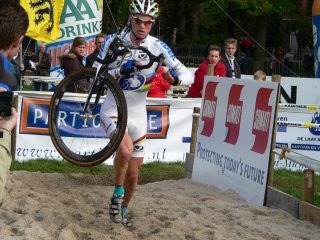
Cyclocross is spectator friendly. I walked the entire course watched all the difficult sections. In several places I could stand and have a 360-degree view of the race. You’re also up close to the racers, with only some plastic tape keeping you off the course. If you’re not careful and lean too far into the course, you can easily get hit.
The crowd watching the race was large – fans there for the race, families from the town, racers who had finished their races. Food and beer of course (do I need to keep mentioning that?).
The pro race had many of the top guys: Sven Nys, Bart Wellens, Richard Groenendaal, Erwin Vervecken. It’s pretty cool to see the guys in person who I’ve only read about.
They started insanely fast, with guys sprinting from the start to get to the first turn off the pavement. Now, I assumed that as professionals these guys would be good, but I could not believe the speed at which they rode on the dirt, and the skill they showed in the difficult sections of the course.
Nys over the barriers:

The race was an hour of absolute intensity. With the exception of Nys, who seemed to float over the course, they all had a look of pain on their faces. No doubt, these guys were tough. I felt bad for the guys who were at the tail end, in danger of getting lapped. They still looked like they were riding as hard as they could go.
Sven Nys won by a pretty comfortable margin. I left with a completely different perspective on ‘cross. If it wasn’t for my still-not-right collarbone, I might even be convinced to try it again.
Nys navigates the muddy section with ease:
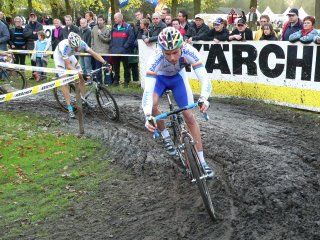
The other guys have a harder time:

No doubt, one of the oddest sponsor names ever:
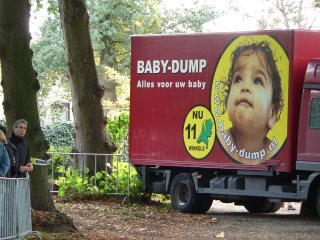
Wednesday, November 01, 2006
Dortmund Six-Day
A six-day race is an indoor track race. Each night teams of two riders compete in a series of different races. There are Madison races (where riders take turns racing, using hand slings to make the change), elimination races, points races, and sprints. There are the derny races, where riders draft behind motorized bikes at speeds of 65 km/h (40 mph!). The teams try to accumulate points and gain laps on their opponents.

Among racers and fans in the U.S. six-day races have a mystique about them. They were very popular in the U.S. prior to World War II. I’ve read that they were as big as any of the six-day races in Europe. For a bike racer or racing fan, being able to sit indoors and drink a beer while watching top riders race around a track is almost as good as going out and riding, especially at this time of year.
There aren’t any big six-day races in the U.S. anymore, but they are still quite popular in Europe. Bike racing in general is more popular in Europe, but I think a big reason the six-days are still held is that the promoters make them into events that are much more than just bike races.
But then again, I’ve noticed that Germans can pretty easily find an excuse to make anything into an event, with copious amounts of beer and food. It seems every other weekend there is a festival of some sort along the Rhine promenade in Düsseldorf.
The Dortmund race is just a short 45 minute drive for me, so I can’t pass up the opportunity to go.
As a racer, I’m interested in the racing. I’m mesmerized as I watch the 220 lap Madison race early in the evening. When you first see this race, it appears to be complete chaos. All the riders are on the track, but only 1 rider from each team is racing. The other teammate is circling waiting to make an exchange (by doing a hand sling). The riders trade off frequently, and they make the hand slings in the tightest spaces. Other riders pull off the front of the group and ride high up the banking of the track. At the same time, riders are trying to break away and gain a lap on the field – which happens frequently. I’m surprised they don’t crash more often.
I lean back and watch the track without focusing on any single rider. When viewed like this, the race looks like a perfectly synchronized choreography. It’s an amazing scene.

A large proportion of the people haven’t come for the racing though. They are here for the event: the food, the beer, the crappy band playing bad American pop music in the dance hall. The food, as expected, is plentiful: different kinds of grilled wurst, pizza, large pretzels, some kind of fish, Turkish gyros, shish kebabs, frites and mayonnaise, Dutch licorice.
They sing along with the cheesy music played during the race (if you can imagine this, “Take me home country roads”, in English, with a thumping electronic beat). They stand and clap, sway back and forth in their seats as if they were in one of the Oktoberfest tents. People smoke while in their seats inside the arena. As the night goes on, and more beer is drunk, it gets even louder.
Erik Zabel, probably Germany’s most popular racer, is clearly the fan favorite. They are visibly disappointed if he doesn’t win a sprint or if he and teammate Bruno Risi don’t win one of the events.
It all adds to the atmosphere.
By the time I leave, well after midnight, I smell like I’ve been to a bar. My clothes reek of stale smoke and grilled meat and will need to be washed. My throat is scratchy from the smoke. And I’ve eaten too much again. I’m going to have to ride a bit longer the next day.

Zabel and his derny partner:
Tuesday, October 31, 2006
Language barrier, part 2
In 1997 I traveled to Italy for a bike racing camp. I experienced for the first time the wonder of being in a foreign country among people speaking a language different than mine. And not just any language, but Italian. I think any single guy who can speak Italian should have no worries. Unfortunately I can’t say the same for German.
I felt I was missing something important by not being able to speak a second language. Here were all these people, many of whom did not have a college education, who could speak at least two languages, sometimes more. After that trip I resolved to learn another language.
At first I thought it would be Italian. I learned some on my own, enough to speak a few phrases on a second trip to Italy. That little taste was enough to convince me I wanted to learn more.
A series of coincidences sent me to Germany for several work trips then led me to find that we had a German teacher giving lessons at work. I then had both a compelling reason (work travel to Germany) and convenient lessons. In contrast to high school Spanish, my German lessons were oriented towards functional usage – useful things like ordering a beer, ordering food, telling someone you’re lost and need directions.
Part of the appeal of my work assignment here was learning more German in advance, being able to use it while here, and then becoming more fluent. So for me it is not so much a language barrier but instead a chance to learn and practice.
On a personal level, learning and using the language is a way to more readily make contact and communicate with the people here. My German has improved, but is still far from what I would consider to be fluent. When someone is speaking fast, I might catch about every third word or so. But even at that level, I’ve noticed that it makes a difference when communicating with native Germans.
When Laura was here, one night we stopped to have a beer in the Altstadt. The waitress started speaking to us in English. At first we thought she recognized us as being non-German. But then we noticed her English had absolutely no trace of a German accent.
She had moved here from California with her German husband. We asked her how it was going. I was expecting to hear her say how great it was, but instead she told us about all the problems she was having. She said that people made fun of her, refused to speak English to her, and gave her a hard time about using English in the bar. She definitely had an attitude towards the language and towards Germans.
Fortunately my experience here has been more positive. I came here knowing enough German for day-to-day living. And I’ve been willing to at least try to use it and to learn more. The people here seem quite tolerant, even appreciative, of my bad German.
Now if only German could sound as sexy as Italian.
Sunday, October 29, 2006
Language barrier
Many people in Germany speak English well, and many more speak at least a little. But not everyone speaks English, and that includes many people you deal with daily: the woman in the bakery, the pharmacist, the man at the vegetable stand.
Even if they do speak English, it doesn’t feel right to walk up and just start speaking in English and assume that they will understand. But if you know absolutely no German that is all you can do.
Laura wasn’t prepared for how it feels to be in such a situation. You immediately identify yourself as being a foreigner – someone different who doesn’t fit in. For me personally, I tend to then feel incompetent, as though I should know how to speak their language and communicate.
Laura noticed this even caused her to change her behavior. She didn’t want to walk into the empty bakery because for sure the clerk would try to talk to her (in German).
I tried to teach her some of the basic things to say: please, thank you, I don’t speak German, do you speak English, where is the bathroom (only they say where is the toilet since “bathroom” would indicate you wanted to take a bath).
Even these few simple phrases are difficult to use in the moment when someone starts speaking a long string of German. I was standing in line waiting for an apple fritter when I saw the woman from the coffee shop come up and ask Laura something – I assumed whether we were done with our coffee cups. Even in this situation it’s hard in a split second to get a few simple words right: ich spreche kein Deutsch (literally, I speak no German). I could read her lips from a distance as she said, in English, “I don’t speak German.”
Laura said this gave her a new appreciation for people who come to the U.S. not knowing any English. I think people who are so adamant about only English being spoken in the U.S. have never been in such situations, and have never attempted to learn and use a second language. It is humbling.
Saturday, October 28, 2006
Pharmacy visit
Somehow my right thumb had developed an infection around the fingernail. In addition to being painful, it was starting to look a bit gruesome. My course of action was to do nothing and wait for it to get better.
My wife, being a nurse, first suggested I see a doctor. I vetoed that one. I was not in a mood to sort out whatever insurance nonsense was certain to result.
She insisted that something be done. She had heard, from where I am not sure, that pharmacies in Germany sell stronger over-the-counter medicines than in the U.S. She is very smart that way.
We walked down to the local pharmacy, and I showed my thumb to one of the pharmacists. The pharmacist knew exactly what needed to be done and brought out several different ointments, gauzes, and bandages.
The problem was she only spoke German. I’ve become pretty good at getting most of the conversation in German, but here was a case where I needed to do better than get most of the conversation. I needed to get the details right. I was picturing what my thumb might look like without the fingernail.
One of the other pharmacists spoke a little English. Between our German, English, and various hand signals, we figured out what we needed to do. The first ointment was some kind of strange-smelling, green goo. But it worked amazingly. Within a day, the infection had come to the surface. A couple more days with the second ointment and my thumb was mostly normal.
Good thing too, because while bandaged I realized how useful the so-called opposable thumb is. Ever try going to the bathroom without being able to use your thumb? Try it sometime.
Friday, October 27, 2006
Seeing what's here
I planned to play tour guide and show her around Düsseldorf. Her visit was also a good opportunity to explore, try some new restaurants, and see some places that were new to me too. I had done some research, talked to people, and had a bunch of ideas for interesting places to go and things to see.
What I forget is that simply being here is interesting.
We leave the apartment to walk to one of the neighborhood stores. After being here for 3 months now, this is routine to me. But for her, everything is new: the different houses, different cars, the little beer store on the corner.
My intention is simply to walk to the store, but she wants to go slow and stop and look at everything.
We pass by three bakeries and a dessert shop within 15 minutes and stop to look in each one. She comments, here and elsewhere during the week, how everything looks so good, and is displayed so well with just the right lighting. I realize that is why I always want to stop and buy something.
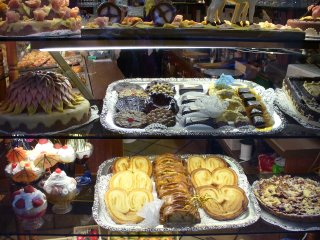
There is a small open-air market in the neighborhood on certain days. We stop at the produce stand to look at a vegetable called Romanesco (I think we call it “Broccoflower”). It looks more like something you’d put in a plant arrangement.
There is an olive stand, a meat stand, a cheese stand. We buy olives, small peppers stuffed with cheese, stuffed grape leaves, fresh bread, then walk down to sit by the Rhine and eat lunch.
She comments that the “fast food”, if we can call it that, is good here. There are little stands and kiosks where you can get currywurst and frites, sandwiches of all kinds on nice bread, freshly made apple “pfannkuchen” (essentially an apple fritter). She notices people eating long bratwursts on small rolls, with the ends of the bratwurst sticking out on both sides. You can even get nice sandwiches and bakery at the gas stations on the Autobahn.
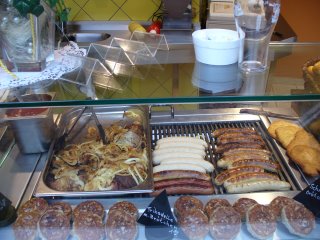
She notices that people seem well dressed and not at all sloppy looking.
More than anything she notices the dogs. Dogs in the airport. Dogs in restaurants. Dogs in stores. People walking their dogs off-leash. The amazing thing is that they are all so uniformly well behaved.
This has surprised me too, and before I leave here I must talk with someone to figure this out. It is no coincidence that the dogs all behave so well. I have not been chased once on my bike. They don’t even seem to pay attention to me.
The downside to the dog situation is that there is dog crap, well, everywhere. This is one of those contradictions about this country. There is mandatory recycling. People sweep and wash the steps in front of their houses. They are meticulous with their cars. Yet people don’t clean up after their dogs.
On our first walk, within maybe 5 minutes, Laura notices this too. I tell her, yes, you need to be careful when walking.
That night we walk to see the Branford Marsalis Quartet, over the river near the old town. I love being able to walk to things here. On the way back, on a dark side street, Laura finds one of the presents left by a local canine resident and almost slips and falls. Welcome to Germany.
That shoe spends the night out on the porch.
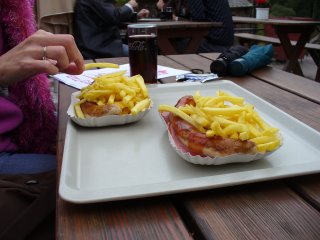
Currywurst and Frites at the Burg Elz.
Thursday, October 19, 2006
Eating and driving
I was in southern Germany, in Bavaria and Swabia, two regions that are known for their peculiar way of speaking German, for the stereotypical eccentricities of the people, and for the distinctive regional cooking.
There was lots of meat, noodles, spätzel, sauces, salads with odd pickled vegetables of unknown variety. It was all quite good but not something I could do on a daily basis. I swear I could feel the butter sauce turning solid in my arteries.
The most interesting meal was the lunch we had at the office of a customer. We arrived around noon, talked for a short time then went to eat in a room where they had some lunch brought in.
They had a bowl with a bunch of cooked Frankfurters (the real kind) in water, then another bowl with big Bavarian pretzels, and alongside, some Bavarian-style mustard. Next to that was a plate of open faced sandwiches, with various meats. Next to that was a selection of beer in half liter bottles.
I took a couple Frankfurters and a pretzel, and a set of silverware. As we started to eat, I noticed I was the only one (there were 5 of us) with silverware. The other guys picked up the Frankfurters with their hands, dipped the end in mustard, and took a bite. Same with the pretzel. Now this was a “business lunch”, and I’m standing there wearing a tie, eating a Frankfurter with my fingers, and drinking beer.
I was told it is a Bavarian custom that employees are allowed a beer at lunch. Personally I couldn’t drink beer for lunch every day, but I like the attitude.
This trip was something of a first for me. I tried in the meetings to speak German first and English only if I had to. I thought my German was coming along well. Actually I was doing pretty well, and then all of a sudden a flurry of words would come, and I would be nodding my head like I understood when I would suddenly realize that I had no idea what was just said. I knew what the topic was, but not the detail. It is humbling when I realize just how much there is to learn with a new language.
Sunday, October 15, 2006
Ride to The Netherlands
Today was a beautiful October day, and I needed somewhere new to ride, so I set out for The Netherlands.
There’s something fascinating about crossing the border into a different country, especially with the bike or on foot. It’s not as though everything suddenly changes, though you do notice immediate differences: signs in a different language, different street names, or the sudden appearance of a bike lane.
It’s more than the obvious differences though. It feels exotic knowing you’ve crossed into a different country and the next person you talk to is probably going to be Dutch (which he was).
Once outside of Düsseldorf there are many bike paths and small farm roads. These are great to ride on, but they have a couple of drawbacks. You can be riding on a nice paved road then suddenly find yourself on a dirt trail going through the woods. On a road bike, that can be a bit treacherous.
The other problem is that on a nice Sunday afternoon many other people have the same idea about going for a ride or a walk.
One of the many farm roads.
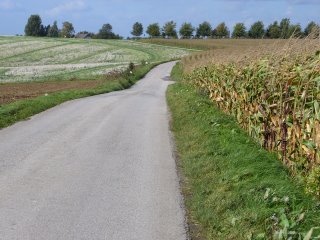
I found a nice farm road, smooth and without many other people. Many of these routes are marked as bike routes. I spotted a sign for Swalmen (NL). Sure enough, after a while I found myself going through a nature preserve on an acorn-covered dirt path. That was manageable.
Then the groups of walkers and people on bikes started to appear. Lots of them. Most people have these little bells on their bikes, and they will angrily “ching, ching, ching” them to get people to move out of the way. Since I have no bell on my racing bike, I will freewheel when coming up to someone, and they usually hear the clicking sound. If not, I will politely say “Entschuldigung” (excuse me).
This was not working today, so I was riding along dodging people and bikes, with my wheels shooting acorns to both sides and hitting people. Honestly I can’t understand how walkers and casual cyclists find this sort of situation enjoyable.
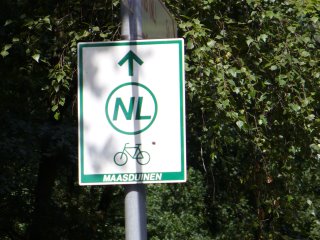
I found my way out of the woods and onto a path along the main road that took me into The Netherlands. I turned to cross to the other side of the road, and waited for traffic. I heard an angry “ching, ching, ching” from a couple coming down the path, since part of my back wheel was on the bike path.
Now, they had more than enough room to pass, and I really could go nowhere except into traffic. But they insisted on riding side-by-side on the path. The guy clipped my back wheel with the large pack on his bike and almost fell. Then turned to look at me as though it was my fault. I had no choice but to give him the universal signal of disrespect (this is how I know I feel somewhat at home here).
I rode for a while in the Netherlands, passing through some nice little villages with interesting houses and landscaping. On the way back, I traded people for cars, and took a more direct route, getting lost only once and making just a short detour through the woods. I felt as though I had earned my late afternoon coffee and Kuchen.
Bikes stopped at the cafe.
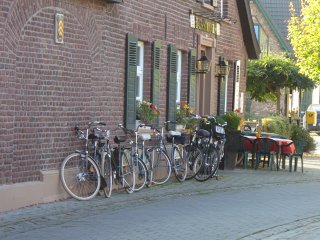
Cute little house in the Swalmen.
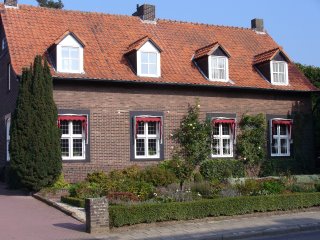
Thursday, October 12, 2006
Summer Fairy Tale
I watched many of the games on television, including all of Germany's. The German team made it to the semifinal game versus Italy, played on July 4th. It was an intense game, scoreless with only a couple of minutes left in the second and final overtime period when Italy scored. It was easily the best game of the tournament despite the outcome.
We felt so let down watching it in the US, it was hard to imagine what the German fans must have felt.
I expected to arrive here finding people depressed about their national team losing, and was surprised to find the mood was bright. There were still signs of the World Cup everywhere – flags, banners, signs for the stadiums on the Autobahn.
I talked to people about this. They were happy to have been the hosts for the tournament. Maybe it was better for one of the guests to win. The team played beyond anyone’s expectations. They are young and will be even better in 2010.
Most of all, people said, this was a significant event for Germans. Since World War II people have been uneasy about displays of nationalism. The World Cup finally gave Germans the opportunity to fly their flag, sing national songs, and openly display their solidarity. By the way people talked about it, I could see it was important.
This is a bit of a long lead-in for what I really wanted to write about.
There is a new film just released here. The title is: “Deutschland. Ein Sommermärchen.“ In English: „Germany. A Summer Fairy Tale.“
It is a documentary made by Sönke Wortmann, a fairly well-known filmmaker who also happened to play professional soccer for a couple years. Wortmann was allowed to be with the team leading up to, and during the World Cup.
He filmed with a small camera, and the result is very intimate and not contrived or artificial. Surprisingly he doesn’t show too much actual game footage, but he shows just enough.
Including the winning goal in the game versus Italy.
There was an audible gasp in the theater when the goal was scored. Then when he shows the reactions of the players going off the field and in the locker room, people were crying in the theater. Hearing that, even I got teary-eyed, in sympathy I suppose.
Such a contrast to the reactions I found upon arriving here. I think maybe now this is Germany’s opportunity to relive losing to Italy and finally be upset about it. 2 more minutes and it would have gone to penalty kicks!
Monday, October 09, 2006
Speaking of food
It also seems that food is one way of exploring the differentness of being here. Every trip to the grocery store is opportunity to find something new -- like yet another type of Wurst I haven't tried. Or have one of those confusing new experiences -- like figuring out how to work the automatic bottle refund machine while the line of people behind grows longer until someone steps up and shows me how it works.
There is one place where I don't have to think too much about the food. At work we have a small cafeteria. They put out the weekly menu at the end of the previous week, like a school lunch menu. Each day there are two meal choices. This usually involves some kind of meat, usually a sauce, usually a vegetable or salad.
You can also order something like a salad, which I do on occasion, but I always feel weird doing that.
You see, there are a couple women who work in the kitchen making the food, and I always feel bad if I don't order something substantial. I'm sure they don't make everything from scratch but it sometimes seems that way. I've seen them mashing potatoes, frying spätzle, stirring gravy. Not eating a substantial meal is like letting your grandmother down.
You have to place your order by 9:30 that morning. At first this seemed so bizarre to me. I could not imagine having to remember to walk down to the cafeteria and place an order, and then have to worry about getting it right in German. But then it became a ritual, and another opportunity to learn a little more German. They even cut me some slack when I come at 9:33. And they do notice that it is 9:33.
We have our assigned time when we are supposed to come, I think so they don't have everyone show up at once. And we always start the meal with "Guten Appetit".
Something that initially seemed so odd gradually became charming.
Except today. The main meal was "Leberkäse mit Spiegelei". Leberkäse literally means "liver cheese". Basically this was an odd colored meat loaf. I was told it doesn't typically contain any liver or cheese. Spiegelei is a sunny-side-up egg. So what you have is something that looks like a slice of Spam with an egg on top.
Thankfully today I had brought an apple and a couple bananas. Fruit never looked so good.
Thursday, October 05, 2006
Eating off a board
Last week in Sweden we went out to dinner at one of the local restaurants. One of the guys pointed out the restaurant’s specialty, something called a “plank steak”.
Now it clearly said “plank” but somehow my brain registered it as “flank”. So I was picturing, without really thinking about it, a marinated and grilled flank steak.
When it came, it was a steak that had literally been cooked on a plank – as in, a rectangular piece of charred wood. The guy who recommended it said, “Hmm, that one looks like it’s been used a bit.”
The border of the plank was trimmed with a huge amount of mashed potatoes, decoratively placed (using a pastry bag I presume).
As odd as it may sound, it was quite delicious.
We each ordered beer – a brand they said was brewed locally. I had heard that beer was expensive in Sweden and Denmark, but I was not prepared to pay something like a million Swedish Kronor. Actually it was only 60 SEK, which came to around $8 for a single beer. That would be cause for mass protest in Germany.
We talked about this, and the guys said that alcohol is heavily taxed in Sweden and Denmark, partly as a way to discourage people from drinking. The unintended consequence is that people drive over the border to Germany and literally fill up their cars with beer. Because of the EU they can bring the beer across the border without paying any additional tax (provided it is for “personal use”). Sure, I can personally drink a car load.
The further unintended consequence is that people tend to drink even more because they have mass quantities of beer conveniently on hand. I didn’t doubt this because Friday night back in Copenhagen, the amount of public intoxication was impressive. I saw groups of people hanging around the various public squares with plastic cases filled with beer bottles. It all seemed quite friendly though, and I think I could have walked up and joined them.
The guys told me there is a similar phenomenon with sugar and sugar products. But no, I didn’t see groups of people hanging around eating mass quantities of candy bars.
I had an early flight from Copenhagen back to Germany, too early for the hotel breakfast. After the 5-mile, 200 DKK ($34), cab ride to the airport (there must be tax on that too), I bought a surprisingly good Danish pastry for my breakfast. I realized there is a benefit to paying $10 for a piece of pastry: I did not hesitate in using my (company) credit card to pay for it.
Tuesday, October 03, 2006
Driving to Sweden
So I must admit to feeling some satisfaction when I see a native European have the same kind of trouble.
Last week I was at a seminar in Copenhagen then would be visiting with a company in Sweden the next day. Two guys from the company were at the seminar, and they were going to drive me the 2 hours to Sweden.
Their names were Mats and Martin, and they had just started with the company after finishing college. Martin was going to drive. Right away I could tell he had this endearing sort of ineptness about him. He seemed like the kind of guy who would lose his car in the parking garage, but would laugh about it.
Which was exactly how the trip started out.
We found the car though, which was actually the company minivan, which was a new experience for Martin. You don’t see too many minivans here (and then with an automatic transmission).
He tentatively put the van in gear and backed out of a space which was meant for something about half the van’s size. When we got to the gate to leave the garage, we needed a validated ticket to raise the gate. Martin had misunderstood where the free parking was. We had to pay – which meant going back to the payment machine. But by this time, there were already a half dozen cars backed up waiting to get out. He pressed the button at the gate to speak with someone.
“Do you know Danish?” I asked.
“If we speak Swedish, they can understand us. But we can’t usually understand them.”
“Do you know what she just said?”
“Actually, no”.
In the meantime, Mats had jumped out and validated the ticket. The whole thing had gotten Martin a bit flustered, because when we pulled out of the garage, he made a left turn into 3 lanes of oncoming traffic on a one-way street. In the blare of horns he froze. We got him to finally turn the van around, going up on the sidewalk.
Once Mats and I finally stopped laughing, Martin said, “Not a word of this tomorrow.”
Now, to really appreciate this, you have to imagine a Swede saying this in English, with the stereotypical melodic way the Swedish speak English. Think of the Swedish Chef from the Muppets show. Actually you can see him at: http://www.youtube.com/watch?v=mbs64GvGgPU&mode=related&search=
There is also an “Enchefenizer”, which will take English and transform it into what the Chef would say. The amazing part is it is exactly how Martin was talking:
“Nut a vurd ooff thees tumurroo.”
(Not a word of this tomorrow)
“Iff unyune-a sev thees fun zeey veell nefer by unytheeng frum us.”
(If anyone saw this van they will never buy anything from us.)
A few moments later followed by, “I'm ell sveety noo” (I’m all sweaty now).
I was then laughing to the point of tears.
The initial wrong turn meant we got started in the wrong direction. After 40 minutes, 4 U-turns, and a stop at a gas station we still had not found our way out of Copenhagen and to the motorway.
“Thees is insune-a. Zeere-a ere-a nu seegns [signs] in Cupenhegee.”
And it really did seem that way. Finally I spotted a sign for the airport, which I knew was on our way to Sweden.
After driving a while on the motorway, Martin said, “I elveys vundered hoo sumeune-a cuoold dreefe-a zee vrung vey. Noo I knoo.”
Which then started another round of laughter.
About 30km from our destination, the motorway was closed due to an accident the day before. A truck carrying paint had overturned. We inched along in traffic on a secondary road. Our scheduled 2 hour trip was approaching three hours.
Mats pointed to the fuel indicator, now getting close to “E”.
“Zeey tuld me-a zee tunk ves fooll. It ves nut fooll.”
They kept apologizing to me, as if it was their fault we were stuck in traffic.
Eventually we made it to my hotel, without any further incidents (except for Martin giving up on parallel parking the van in front of the hotel after 3 attempts).
Later that night I ate dinner with their manager and 2 other guys. I had promised not to talk about the wrong way driving. So all I said was, “they seemed a little nervous and kept apologizing for the traffic. Oh, and we almost ran out of gas.”
They looked at each other and burst out laughing. Somehow I think this has happened before. Their manager smiled mischievously and said, “I’ll tell zeem zeere-a vere-a sume-a cumpleeents ebuoot zee dreefing.”
Wednesday, September 27, 2006
Beautiful race
I will always remember what Ron Palazzo, the guy who ran the camp, said to me as we waited for the race: “First you hear the helicopters, then the race caravan starts to come through, then you see the long line of riders wind up the mountain. It always brings tears to my eyes. It is a beautiful sport.”
When the race finally came through, I knew what he meant. We waited in the cold and rain for hours, but it was worth it when we stood in the road and cheered for the riders struggling up the mountain.
I felt the same way in 2002 when a work trip amazingly lined up with the World Championships in Zolder, Belgium. I remember riding the train early Sunday morning to the Elite Men’s race. The train was packed with people speaking French, Flemish, Spanish, Italian, English, German, and who knows what else.
That day I got to eat frites and mayonnaise, drink Belgian beer, and see the Italian team deliver Mario Cipollini to the final 200 meters (after which there was no question who would win). I felt as though I had stepped into one of the European cycling videos I watch in the winter while on the trainer.
I wondered if I would still feel that way in Salzburg. Simply being in Europe, for a race, wasn’t a novelty anymore. It wasn’t until the day before leaving that I was even sure I would go.
But then, while driving to my hotel, I passed a couple of Spanish team riders, then a couple from the Netherlands. My heart started to beat just a little faster.
Saturday morning, just before the start of the Men’s U23 race, I was finishing breakfast when I heard the helicopters overheard. In that instant, I was ready. I grabbed my backpack and rode down to the start, just in time to see the U23 men finish their first lap.
First came all the police motorcycles (and clearly they were enjoying it), then the lead cars, then the riders, then all the support cars. It’s an amazing spectacle. Having organized a couple of local races, I cannot even imagine what goes into an event such as this.
U23's on the first lap.

Because the races are contested by national teams, rather than by the normal pro trade teams, there is a large amount of flag waving and enthusiastic but good-natured cheering and national rivalries.
The Danish and Italians can still drink together.


The road race is held on a circuit, this year 22km in length, so the spectators see the racers many times. We saw the U23’s do 9 laps, the women 6, and the Elite Men 12. That’s a lot of racing over 2 days (and those who came earlier in the week saw the time trials also).
Combine the number of races, the course, the people from all over the world, and you have an event that is a cyclist’s dream.
Late Sunday afternoon, when the men’s race had ended and the Italians were again celebrating, I got on my bike to ride back to the hotel. With the races over and everyone leaving, it suddenly seemed very lonely. I stopped and took a picture of Paolo Bettini’s face frozen on the video wall, then followed an Austrian couple down the hill, on a back way into Salzburg.
Next year the race is in Stuttgart. I’m already thinking about it.

Friday, September 22, 2006
Surprise ride
Here I am in Salzburg to see the World Championships. The drive was 7 hours of white knuckles from the traffic, road construction, and other drivers. The last kilometer to the hotel took about 40 minutes through Salzburg. I was cursing the decision to drive rather than take the train.
But because of the car, I have the bike. I’m here early enough to go ride, and I figure that’s the best thing to get rid of the driving stress. I want to see if I could ride part of the road race course. As it turns out my hotel is only 1km from the start/finish, so the start of the course is clearly marked.
I start out riding and quickly realize that the course is completely closed to traffic and lined with barricades (all 22km of it). There are other people riding it too, and we have the whole course. I’m thinking, this is amazing. I just cannot help myself from riding hard. With the course closed, the other riders, people watching along the course, it feels like a race.
I ease up and pull out my camera and take some pictures while riding. A 4 man group (Austrians I think) I had passed comes by in a paceline, and I jump in. When I get to the front we start up the first climb. I go a little harder, look back, and the other guys are gone.
I take some more pictures and a guy in a yellow jersey and hairy legs attacks me on the hill. OK, this is serious now. I get out of the saddle and go by on the steep part. People at the top are yelling “Forza”, “Allez”, and I swear I hear a “go Torelli”.
On the downhill I catch a guy in a full US Postal kit. He latches on, then at the 5km sign I say, “we’re sprinting at the end, right?” He laughs and says no. When I ease up to take some pictures again, Yellow Jersey Guy attacks. He came back on the downhill! This I cannot let go. I ramp it up and pass him in the finishing stretch, almost taking out a girl in the crosswalk. Oops.
At the end of the first lap, I realize I had not eaten anything the entire day, only coffee. I stop and buy 2 Mars bars and some awful carbonated apple drink. The sugar boost is enough for another lap.
Unfortunately the course has now been opened to traffic, so we are dodging cars on occasion and cheating the red lights. I hook up with a group of 3 guys. I figure I will be nice and not go hard on the hill, but then I think, hey, this is the Worlds. There is no mercy here. I want to get a sense of how hard this course will be for the pro’s. So I go hard and pass them. Then I pass some guys walking. OK, so maybe the “competition” isn’t the strongest.
On the way back to the hotel, some local woman on a “city bike” in essence flips me off because I got in her way. I just give her a look that says, “I just won Worlds. Like I care what you think”.
The first group.
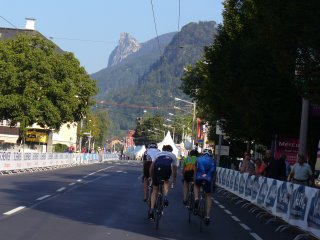
Yellow Jersey Guy (with chainring tattoo)
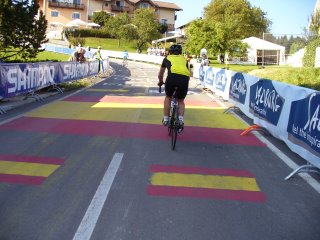
The steep (notice the Gerolsteiner guy).

I beat this little punk too. He ended up walking.

No my name is not on the road.
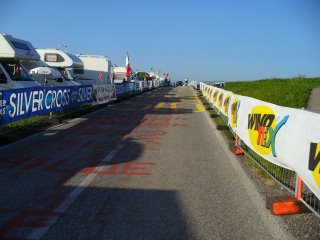
Tuesday, September 19, 2006
A problem everyone should have
The UCI World Championships (bike racing of course) are going on in Salzburg, Austria. That’s a 6 or 7 hour drive for me (or 7-8 hours by train). Salzburg is supposed to be nice, I’ve read that the course should be good this year, and it’s very cool to see one of the biggest pro races of the year.
Then there is Oktoberfest in Munich. The real Oktoberfest. This is about a 5 hour drive or 6 hour train ride. I’ve never been there, and I’m sure it would be crazy. (though finding a hotel is a bit questionable at this point).
Bike racers who don’t enjoy beer would probably say go to Salzburg. Beer drinkers who don’t ride would say go to Munich.
And what if you enjoy both beer and racing?
Help me out, ‘mates!
Sunday, September 17, 2006
Last race (?) of the season
I found two different races I could potentially do this weekend. I chose the race that was about 2.5 hours away, because it was somewhere I hadn’t been before. One of the nice things about racing here is even the trips to and from the race can be enjoyable.
One the way, I passed many fields full of these yellow flowers. I’m not sure what they are, but they were gorgeous.

The race was yet another criterium, but at 70km quite a bit longer than the others I’ve done here which I hoped would be to my advantage. There were two very tight turns, one of them onto a road that was only a bit wider than a bike path. Fortunately there were only 30-35 guys in the race for a change. For me, in a criterium, this makes all the difference. I could not imagine this course with 90 guys.
After I got my number and was riding back to change, I stopped and talked with a couple of local guys watching the race that was going on. They told me there were crashes because the riders were scared ("angst") going through the corner. They said they had told the organizers it was too tight, but did they listen? They looked at my bike -- not one you see around here -- and asked where I was from (they usually guess England). Then asked, how did I know about this race? Ah ... the Internet.
I wanted to be patient and wait for the 2nd half of the race to do any serious attacks. But no one was making the race hard, so sometimes patience isn't the right answer. I attacked and 2 other guys came along. We got caught after a couple of laps.
Right as we got caught I attacked again, and we had a 4 man group. After several rounds of attack-and-chase, finally I got away with the same 2 guys from the first break.
It’s funny how that happens. Sometimes it doesn’t take long to sort out who wants to make the race go that day.
With about 20 laps to go, another group of 4 joined us. The announcer kept running through the names in the break. Every time he said my name, it was always, “Brian Batke aus den USA”, as though I were some celebrity racer over here. I guess we would probably do the same at one of our local races.
Normally I would not want to sprint from a group of 7. But with about 5 laps to go my right calf started to cramp, so I wasn’t up for any late lap attacks. I was in pretty good position (3rd wheel) as we headed for the last corner. Then one of the guys did this impressive kamikaze attack over the grass on the side of the road. Must be a cyclo-crosser. As everyone scrambled to get his wheel, I lost my position and then only managed 5th in the sprint.
I can’t complain though. It was a fun race, I was one of the animators, and afterwards stood around BS’ing with the other guys in the breakaway. For my 10Euro entry fee, 5th place got me 60Euro, a set of Look cleats, some tire levers and some bottled water.
I hung around after our race to see one of the most fredly things I think I’ve ever seen: a criterium for recumbent bikes. Not that I have anything against recumbent riders, but one of them was racing in long pants and a shirt with a pocket protector. I am not kidding. At one point, two guys crashed in the tight corner. They were going so slow I think they might have just tipped over.

I drove home through some insane Sunday afternoon traffic. It was as if all of northwestern Germany was on its way back from somewhere. As I drove I was thinking, maybe I should see if there’s a decent race on the calendar next weekend.
Friday, September 15, 2006
Home and back
I was curious how it would feel to be home again. Would it feel as though I’d been gone a long time? Would it feel strange to be in the
Surprisingly, it seemed like I’d been gone maybe 2 weeks – like I had been on a longish trip for work. I guess you can’t undo a lifetime of living in the
You can however start to pick up some new habits. Like driving. My wife said I was driving like a German: too fast, too close, and too much on the brakes. I hadn’t consciously noticed this until she pointed it out. 65mph seems very slow when 75 to 90 is the normal cruising speed.
It was great to see everyone, but in retrospect I tried to cram way too much stuff into a short period of time: 2 picnics, Taste of Cleveland event, soccer game, football game, movie, 2 bike races, work meeting, drive to
The low grade headache I had from the flight home didn’t go away for 4 days. Lesson learned.
Now, about the bike racing. Sunday morning I drove out to Tamarack, PA for the Tour de Tamarack road race – a race where I’ve always done well. The radar looked clear but as I got closer, it started to rain. I was thinking about the last race in
Unfortunately my legs weren’t as committed. Maybe it was the jet lag, or the low grade headache, or the rain, but I felt pretty bad the entire race. In the end I didn’t even try for a placing.
The weather turned better on Monday, and I was looking forward to the Tuesday night
The week went by even faster than I anticipated. Fortunately the nice weather followed me back here. I got off the plane, drove home, drank some coffee then went out for a 3 hour ride under blue skies and sunshine.